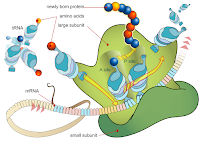The mutation that seemed to have the greatest effect in our lab was deletion, and the mutation that seemed to have the least effect was substitution. During some cases, substitution can cause no change to the amino acids determined and the protein can stay the same. However, in other cases, substitution can cause the protein to change a lot. Insertion could also cause very similar effects as deletion. It is very important where the mutation occurs. If it happens near the beginning of a sequence, then it could become very harmful, whereas if it happened near the end, there would be less of an effect. It would be different if the T that we substituted for C were near the end of the sequence because then it would have caused less amino acids to change; therefore, leaving the protein mainly unchanged.
When we got the chance to choose our mutation, I chose deletion because I wanted to see how much it would change if I deleted the very first base in the sequence and then again later on. This mutation was different than the others ones we tried because this sequence didn't even start coding until near the middle of the bases. There was no "met" amino acid to tell the ribosome to start coding until it got to the middle of the sequence. It does matter where the mutation occurs because if I hadn't changed the first base and say I changed the last, then the protein would have had a start codon in the beginning.




No comments:
Post a Comment